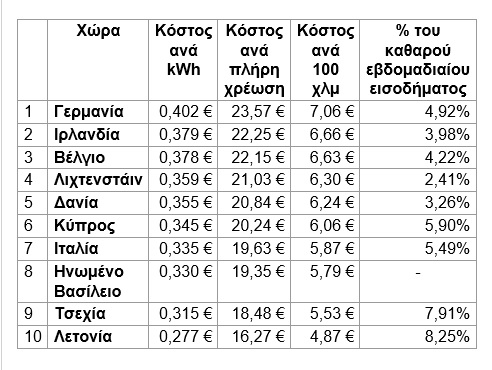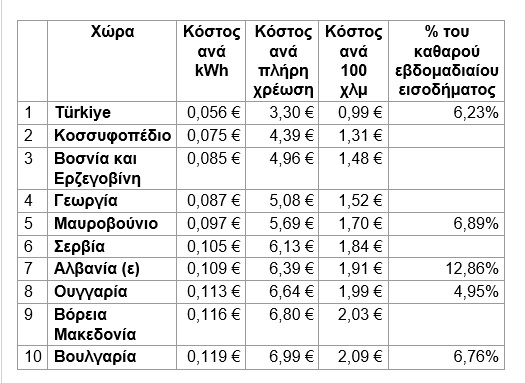Filenews 14 May 2024
New research from Switcher.ie reveals the latest cost of charging an electric vehicle (EV) across Europe and ranks the most expensive to cheapest countries. We also look at grants and purchase subsidies and calculate how much a full EV charge costs relative to weekly income per country.
Using the latest Eurostat data, we have determined the cost of charging electric vehicles at home across Europe for the 20 best-selling battery-electric cars.
In 2023, it cost, on average, €12.63 for a full charge and €3.78 for a 100km road trip, with an average increase of 4.44% across Europe – although costs and price changes vary greatly.
• Cyprus is the fifth most expensive country for electric car charging €20.24 per full charge and cost €6.06 to drive 100 km.
• The average cost of EV charging in Cyprus increased by around 4% in 2023 compared to 2022, while across Europe, the average change was 4.4% in 2023, with many countries experiencing sharp increases or sharp declines.
Germany, Ireland and Belgium are the most expensive countries for EV charging in Europe at a cost of €23.57 per full charge.
Turkey, Kosovo and Bosnia and Herzegovina are the cheapest countries to power an electric car, with a full charge costing just 3.30 euros.
A full charge in Europe costs 5% of their net weekly income (on average) with Albanians having to part with 12.9% of their weekly income to charge their electric car, as opposed to Icelanders who spend only 1.3% of their weekly pay to power their cars.
Top 10 most expensive countries to charge an electric car in Europe
More expensive countries for EV charging tend to have a higher EV market share in new car sales and more electric and hybrid vehicles on the road. Despite high electricity prices, charging costs are lower as a percentage of median incomes, with the exception of Latvia and Czechia.

Top 10 cheapest countries to charge an electric car in Europe
The cheapest places in Europe to operate an electric vehicle are mostly in central and southeastern Europe, where electric vehicle ownership is less popular.
These countries tend to have lower sales and a smaller EV market share due to the prohibitive cost of many EVs and hybrids. They are also less affordable to execute when costs are determined against median profits.

Eoin Clarke Commercial Director of Switcher.ie:
"The latest Switcher.ie survey found that average home charging costs are still rising, but prices are fluctuating hugely across the EU, with some countries seeing sharp declines and others seeing sharp increases in 2023. This is largely due to government support during the energy crisis and ever-changing global headwinds affecting countries differently.
Although electricity costs are still historically high, energy prices have peaked and electric vehicles are not as depleted on a budget as gasoline or diesel vehicles are to keep on the road.
Electric vehicle sales have seen a downturn recently as many governments phase out initiatives such as purchase grants and tax benefits, but as motorists seek a haven from high fuel pump prices, it's likely the EV market will recover and continue to thrive.
As EV prices drop and charging infrastructure continues to improve, it may be time to consider switching. Be sure to do your research beforehand though. Shop for the best deal, take advantage of any grants and incentives, and look out for energy tariffs and car insurance designed specifically for electric vehicles."
Link to study https://switcher.ie/
Sources:
• Eurostat
•Hundred
•THAT
• SIMI
